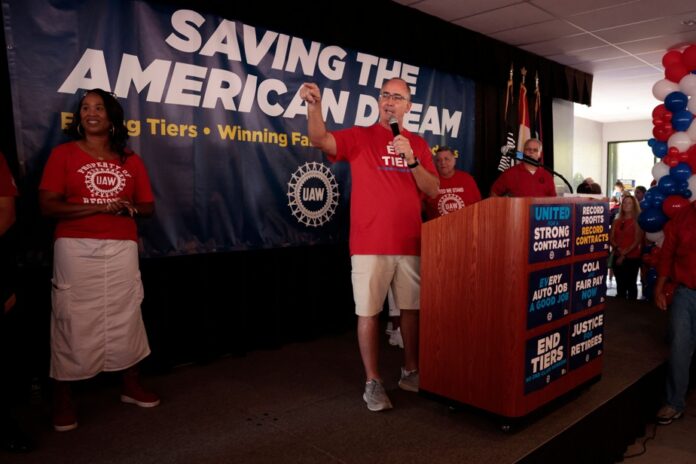(New York) The major American automakers are railing against the fiery new president of the powerful UAW union to draw up their future collective agreements, with the risk of a fall strike in the background.
Shawn Fain, president of the United Auto Workers union for just five months, has set the stage for a possible industrial action if there is no deal by the September 14 deadline.
The UAW announced Friday the result of a consultation of its 150,000 members, prior to any work stoppage: they gave the green light to 97% in principle, according to the average established between the three groups.
“Our members are clearly tired of dragging the devil by the tail while the ruling elite and billionaires continue to line their pockets,” Fain said in a statement.
“The Big Three were gorging themselves while we were toiling away,” he added, using one of the nicknames of Detroit’s big automakers (General Motors, Ford, Stellantis).
Experts consider it more likely that only one group is affected. The last strike dates back to 2019, at General Motors.
“Record profits deserve record contracts,” Fain said at a Sunday rally in northern Michigan. “We will get them by any means necessary.”
The country’s unions are currently enjoying a tight labor market with an unemployment rate of just 3.5% in July.
A double strike has paralyzed Hollywood since May (screenwriters and actors). The UPS carrier narrowly escaped, at the cost of a “historic” collective agreement according to the hardline Teamsters union.
US President Joe Biden is keeping an eye on these negotiations and made this known in mid-August by advocating for a “win-win” and “fair” deal strengthening workers’ rights during the transition to electric vehicles.
According to Mr. Fain, employees should benefit from a 40% increase in their remuneration, like that granted to the leaders. He also calls for the restoration of measures to adapt to the cost of living, a guaranteed retirement for all employees and the abolition of multiple salary grids.
He defended his call for a 32-hour week on Sunday, criticizing leaders for working from home during the pandemic while “our members were expected to risk their lives and some sacrificed their lives. life “.
The pandemic “has generated a feeling among American workers that they no longer have to tolerate poor working conditions,” said Michelle Kaminski, a professor at Michigan State University who specializes in corporate social relations. .
“These are the most favorable circumstances for unions for several decades,” she added.
Shawn Fain was working as an electrician at a Stellantis factory in Indiana when he narrowly won the UAW’s first direct presidential election.
During his campaign, the trade unionist presented himself as a reformer and criticized his predecessor for being too close to the leaders. Once elected, he maintained this combative stance, notably refusing to shake hands with the bosses at the start of negotiations.
A few weeks ago, he trashed Stellantis’ latest proposal, which called the move “theatrical and a personal insult.”
“Granting all of Mr. Fain’s requests could threaten our ability in the future to make decisions that provide job security for our staff,” Stellantis said in a letter to employees, arguing for an agreement “based on the economic realism”.
General Motors said it is “working hard every day with the UAW to ensure that we reach a correct agreement for all parties.” And Ford said, “I look forward to working with the UAW toward creative solutions…at a time when our rapidly transforming industry needs a skilled, competitive workforce more than ever.”
Shawn Fain took a cue from Teamsters boss Sean O’Brien by making regular public talks about negotiations and holding “picket rehearsals.”
“For sure, he’s going to deliver a favorable contract,” added Harry Katz, a professor at Cornell University’s School of Industrial and Labor Relations.
According to him, the risk of strike is quite present.
